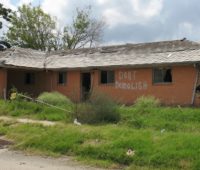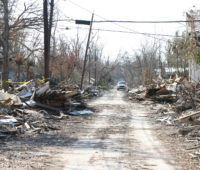In this paper, I focus on the process of evacuation and how, in the case of Hurricane Katrina, this casts light on the position of older people in contemporary western society. All the evidence I draw on I have gleaned from the Internet. I have not interviewed anyone by phone or email. Most of the […]
As analyses and “spin” of the Katrina crisis grow, we confront the sort of public issue to which a social science response is urgently needed. Accordingly, the SSRC has organized this forum addressing the implications of the tragedy that extend beyond “natural disaster,” “engineering failures,” “cronyism” or other categories of interpretation that do not directly examine the underlying issues—political, social and economic—laid bare by the events surrounding Katrina. Essays on this site explore a number of subjects related to:
- Structures of vulnerability, including the race, class, gender, and age of those suffering most
- Political projects that have distorted the pursuit of “homeland security”
- Bias that has sent federal resources disproportionately to rural areas and suburbs rather than cities
- Media coverage of the disaster
- Response from the American public
- Philanthropic and charitable responses
- The physical infrastructure on which cities depend (and its vulnerabilities)
- The implications of the Iraq War
- Problems of oil dependency and related infrastructures
- Environmental policy and global warming, wetlands management, etc.
- Costs of “privatization” and cuts in government capacity
- Leadership at every level
- Law enforcement and public order
- Predicting “emergencies” and responding to predictions
- The economic implications of catastrophic events
- Comparisons: to the recent Asian tsunami, to 9/11 in New York, to earlier hurricane disasters in the U.S., etc.
Improvising Disaster in the City of Jazz: Organizational Response to Hurricane Katrina
by Tricia Wachtendorf and James M. KendraNew Orleans is often affectionately referred to as the Birthplace of Jazz. Whether through the city’s festivals that attract hundreds of thousands of attendees each year, its legendary musicians, or its dark and smoky clubs, this genre of music that demands both creativity and style—and where the concept of improvisation lies at the core of […]
The Red Pill
by Kathleen J. TierneyIn the first episode of the film trilogy The Matrix, lead character Neo was given the option of taking a red pill, which would enable him to understand what was actually occurring outside the illusion created by the Matrix, or a blue pill, which would allow him to return to experiencing only that illusion. Because he […]
Toxic Soup Redux: Why Environmental Racism and Environmental Justice Matter after Katrina
by Julie SzeMuch has been said and written about Katrina in the last few weeks, but one glaring omission has been not incorporating the perspective of environmental justice activists, theorists and researchers. Environmental racism and environmental justice are particularly useful frameworks for understanding the devastating environmental, social and racial effects of Katrina’s impact and aftermath. The lack […]
Weather Media and Homeland Security: Selling Preparedness in a Volatile World
by Marita SturkenHurricane Katrina exposed social inequities within the United States in stunning relief. As such, it is quite typical of weather disasters which, with rare exceptions, impact the poor in significantly higher numbers, though rarely is this exposure so dramatic and so widely disseminated. As an event that has rendered visible the failed infrastructure of U.S. […]
There’s No Such Thing as a Natural Disaster
by Neil SmithIt is generally accepted among environmental geographers that there is no such thing as a natural disaster. In every phase and aspect of a disaster—causes, vulnerability, preparedness, results and response, and reconstruction—the contours of disaster and the difference between who lives and who dies is to a greater or lesser extent a social calculus. Hurricane […]
Two Cities, Two Evacuations: Some Thoughts on Moving People Out
by Joseph ScanlonOn November 10, 1979, a freight train hauling cars with five different chemicals derailed at a level crossing in the suburban city of Mississauga, Ontario, just west of Toronto. Because they could see and hear propane tanks exploding and could smell chlorine, the Peel Regional Police Force decided to evacuate most of city, or about […]
Catastrophes Are Different from Disasters: Some Implications for Crisis Planning and Managing Drawn from Katrina
by E.L. QuarantelliHurricane Katrina has reinforced the view of some researchers that the scale of any collective crisis has to be taken into account in any analysis .To them, just as “disasters” are qualitatively different from everyday community emergencies, so are “catastrophes” a qualitative jump over “disasters”. Systematic social science study of disasters (natural and technological) is […]
Using Organizations: The Case of FEMA
by Charles PerrowIntroduction Organizations are tools; their masters need not use them for their nominal ends. The focus of FEMA under President Clinton was natural disaster emergency relief, and preparedness. Under the Bush administration the focus was shifted to combating terrorism, and disaster relief capabilities decayed. That left us unprepared for Hurricanes Katrina and Rita. This unpreparedness […]
Disasters and Forced Migration in the 21st Century
by Anthony Oliver-SmithMigration, whether permanent or temporary, has always been a traditional response or survival strategy of people confronting the prospect, impact or aftermath of disasters (Hugo 1996). However, today, more than ever, the complex nature of disasters such as Hurricane Katrina in the city of New Orleans, bring with them an enormous potential for the uprooting […]














